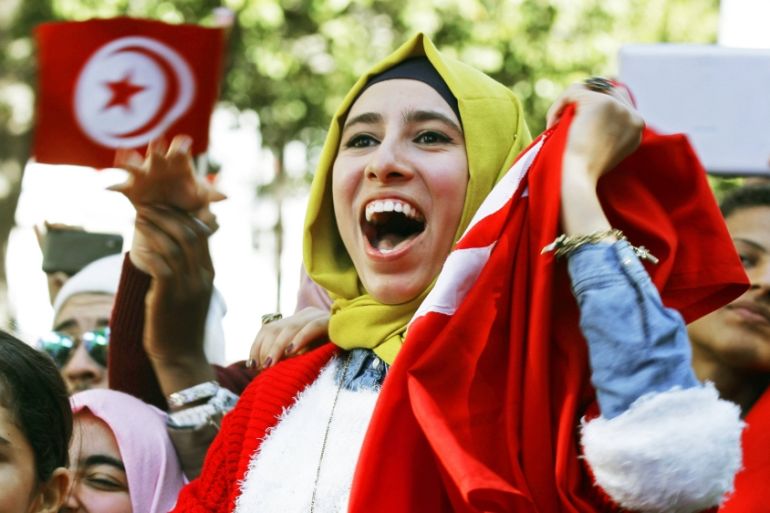Questioning freedom of speech in Tunisia
The recent trials of a controversial blogger and a film-maker have highlighted the need for legal reform in Tunisia.

On January 14, the fourth anniversary of the Tunisian Revolution, Yassine Ayari’s mother spent much of the day pacing up and down Habib Bourguiba Avenue, the main pedestrian thoroughfare in downtown Tunis. Amid the crowds that came to celebrate the historic moment, she carried a simple white piece of paper with the words: “Freedom for Yassine Ayari” and “No to military courts” written in Arabic.
Ayari, a prominent and controversial blogger, was tried in absentia on November 18, 2014, in a military court. He was charged with defaming the military and sentenced to three years in prison, but did not find out about the charges or the sentence until he was arrested at the airport on December 24 upon returning to Tunisia from France, according to one of his lawyers, Samir Ben Amor.
In a retrial on January 20 that saw his defence team walk out of the courtroom in protest, the military court sentenced Ayari to one year in prison. His lawyers plan on contesting the sentence in the military court of appeals, Ben Amor told Al Jazeera.
RELATED: Tunisia’s second revolution
The decision in Ayari’s case follows the January 16 sentencing of film-maker Ines Ben Othman in a civilian court to a two-month suspended prison term for insulting a police officer. After the decision, Ben Othman was released from prison, where she had been held for about a month. The charges were filed against Ben Othman after she attempted to submit a complaint against the deputy director of a police station in a suburb of Tunis.
Shortly after the fourth anniversary of the Tunisian revolution, the two cases have highlighted parts of the Tunisian Military Code of Justice and Civilian Penal Code that remain out of step with international human rights norms.
At the heart and the core of this case lies the freedom of expression issue and the persistence in the Tunisian legal framework of articles that lead to imprisonment for insulting state institution and offending high-level officers.
State institutions, such as the military and police, are using these laws to limit freedom of speech and to perpetuate a culture of impunity, according to Amna Guellali, the director of Human Rights Watch (HRW) in Tunisia.
Ayari was charged and sentenced under Article 91 of the Tunisian Code of Military Justice, an open-ended clause that prohibits the defamation of the military, attacks on its honour and the undermining of morale.
“At the heart and the core of this case lies the freedom of expression issue and the persistence in the Tunisian legal framework of articles that lead to imprisonment for insulting state institution and offending high-level officers,” Guellali told Al Jazeera. She added that, according to international human rights norms, civilians should not be tried in military courts.
Ayari is the fourth civilian since 2011 to be sentenced under Article 91 for criticising or defaming the military.
Ben Othman was arrested on December 19 and charged under article 125 of the Tunisian Civil Penal Code, which calls for up to a year’s imprisonment and a fine for insulting a public official while they are executing their duties.
By international standards, crimes such as insulting a police officer or public official are punishable by fines or other civil penalties, Lotfi Azouz, the director of Amnesty International in Tunisia, told Al Jazeera. “In Tunisia, it is punished by a penal punishment, prison,” he added.
HRW has recorded a number of other cases where individuals have attempted to submit complaints about police misconduct only to end up being charged with insulting a police officer.
RELATED: Tunisia: A revolutionary model?
“Unfortunately, I think these cases are only the apparent tip of the iceberg because what lies beneath the surface is quite a wide pattern of police abuse and prosecutions under this catch all article,” Guellali said.
For Azouz, Ben Othman’s case is sending a troubling message. Following a crack in their power after 2011, the police, formerly the main arm of Dictator Zine El Abidine Ben Ali’s security state, may be trying to reassert their influence, he said.
Youssef Cherif, an independent political analyst, is also wary of the precedent being set in Ayari’s case. After being marginalised by Ben Ali, the army gained favour in Tunisia by siding with protesters. Now, Cherif said, they are taking advantage of their newfound prestige. “They are trying to become untouchable, or at least not permitting certain red lines to be crossed,” he said of the army’s attitude towards criticism.
In the wake of Ayari and Ben Othman’s cases, Amnesty International and HRW have been pressuring Tunisia’s new parliament to add legal reform to its already crowded agenda.
Mehdi Zaoui, a member of the executive bureau of Nidaa Tounis, the party that controls a plurality of seats in the new parliament, said that reform is important, especially to ensure that civilians are not being tried in military courts. However, the changes have not been added to the legislative schedule yet and will likely come as part of a bigger package of reforms at some point in the future.
Follow Eric on Twitter: @eric_reidy